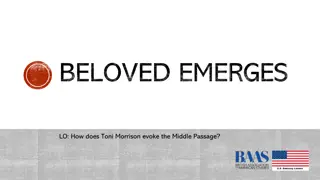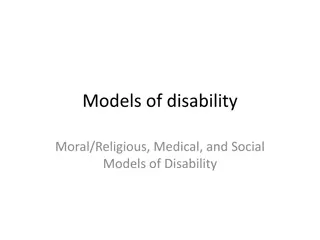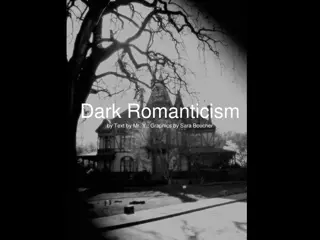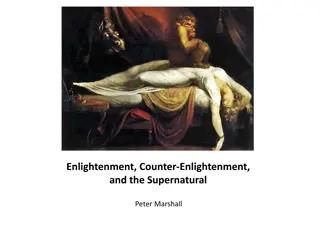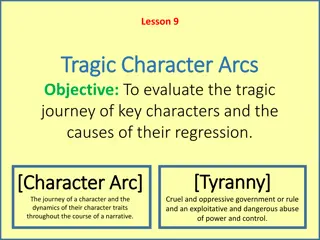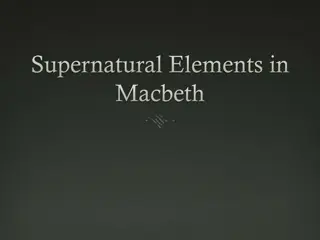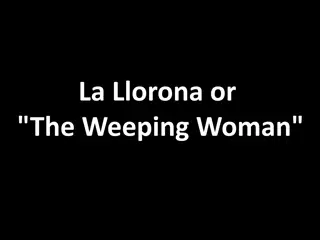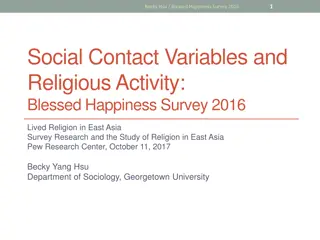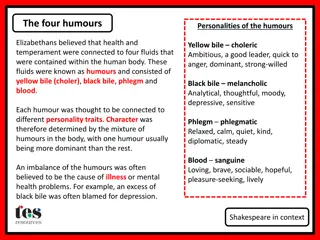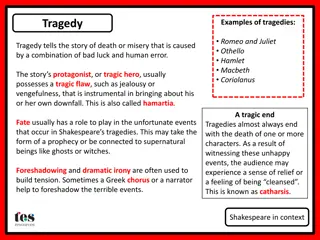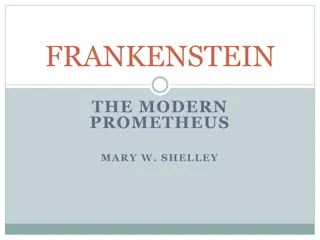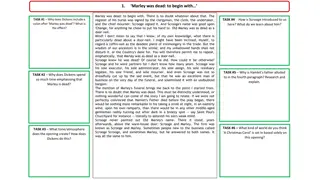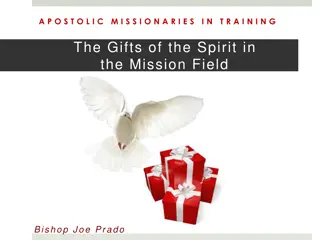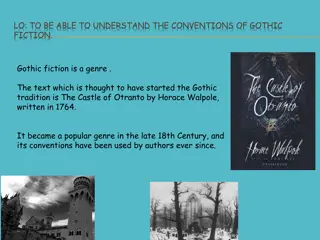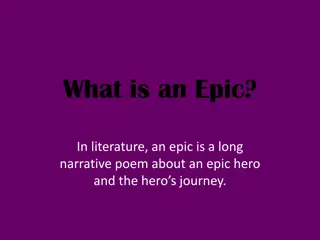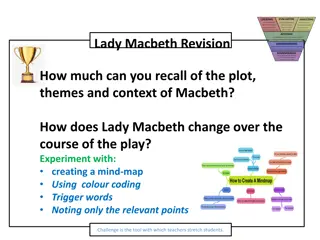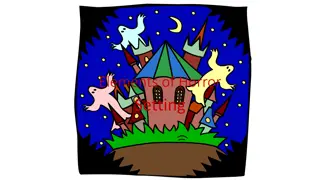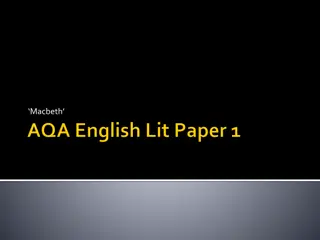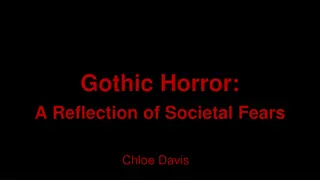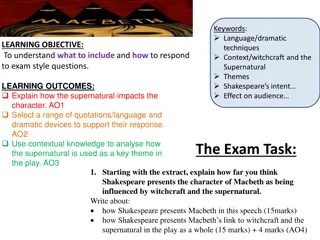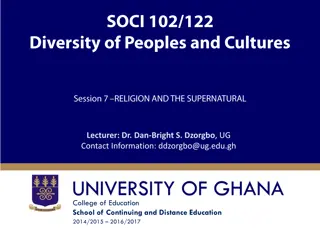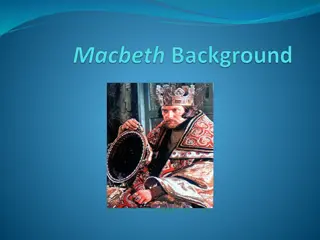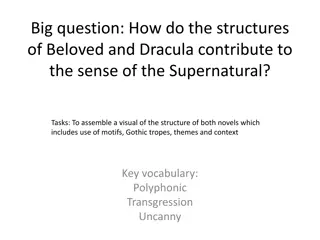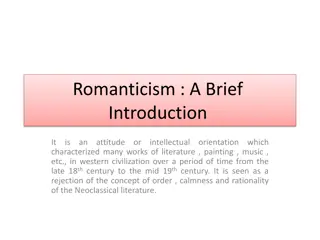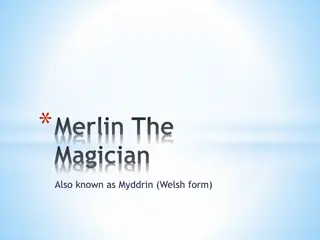Insights into Shakespeare's "Macbeth" and Language Techniques
Explore key themes, characters, language techniques, and historical context in William Shakespeare's "Macbeth." Dive into the tragic hero Macbeth's evolution from protagonist to antagonist, Lady Macbeth's manipulative nature, and the supernatural elements portrayed by the witches. Understand the sig
5 views • 76 slides
READ [PDF] Her Viking Dragon Warrior (Viking Ancestors: Age of Embers Book 2)
14 minutes ago - COPY LINK TO DOWNLOAD = http:\/\/cupangbalapmope.blogspot.com\/?cread=B0CNQP49V8 | PDF\/READ Her Viking Dragon Warrior (Viking Ancestors: Age of Embers Book 2) | After awakening in 16th century Scotland, Kay must face a new world of old mystic beliefs, supernatural beings, and her
0 views • 4 slides
Theories Explaining Deviant Sexual Behavior Throughout History
Explore historical theories on deviant sexual behavior, including demonological, anomie, psychoanalytical, human ecology, and somatotyping theories. These theories range from supernatural beliefs of possession to scientific interpretations of societal influences and individual characteristics.
2 views • 33 slides
Examining Water Imagery in Toni Morrison's "Beloved" and Its Contextualization with Historical Events
Toni Morrison skillfully evokes the harrowing Middle Passage experience in "Beloved" through water imagery, symbolizing themes of cleansing, rebirth, and trauma. By comparing the water symbolism at various points in the novel, readers can explore its significance in relation to historical events lik
6 views • 14 slides
Understanding Models of Disability: Moral, Medical, and Social Perspectives
The concept of disability is explored through moral/religious, medical, and social models. Impairment refers to a loss or abnormality in structure or function, while disability is a restriction in performing activities. The discussion also delves into the significance of person-first language and th
1 views • 35 slides
Divine Turnaround: Keys to Supernatural Transformations
Learn about Divine Turnaround, where God intervenes to bring about sudden, positive changes beyond human understanding. Explore examples from scriptures like Exodus, 1 Samuel, and Luke, illustrating how faith and decisive action can lead to miraculous transformations. Discover the essential keys to
1 views • 12 slides
Dark Romanticism: Exploring a Gothic Literary Sub-genre
Overview of Dark Romanticism, a literary sub-genre emerging from the Transcendental movement but notably less optimistic. Explore its characteristics focusing on the tragic, characters prone to sin and self-destruction, and nature depicted as dark and mysterious. Learn about notable authors like Edg
0 views • 11 slides
Analyzing Neil Gaiman's Writing in "Click Clack the Rattle Bag
Exploring Neil Gaiman's short story "Click Clack the Rattle Bag" in the gothic genre. The story is described as spooky with a mix of dark and funny elements. Readers delve into the unexpected ending and sinister undertones, making it ideal for fans of horror and supernatural themes. The narrative sk
0 views • 29 slides
Enlightenment, Counter-Enlightenment, and the Supernatural
The relationship between religion and the Enlightenment was characterized by a shift towards viewing them as non-antagonistic entities, despite some lingering conflicts. While the Enlightenment aimed to combat religious bigotry and superstition, it did not eradicate supernatural beliefs entirely, le
0 views • 8 slides
Exploring Tragic Character Arcs in Macbeth: A Study of Tyranny and Regression
Delve into the tragic character arcs of key figures in Macbeth, examining the themes of tyranny, regression, and the impact of power dynamics on character development. Explore the profound and haunting journey of Lady Macbeth, analyzing her descent into darkness and ultimate tragedy. Investigate Sha
1 views • 12 slides
Supernatural Elements in Macbeth: Witches, Dagger, Ghost
The supernatural plays a crucial role in Shakespeare's "Macbeth," providing intrigue, insight into characters, and enhancing pivotal scenes. From the mysterious witches to the eerie floating dagger and haunting ghost of Banquo, these supernatural elements add depth and complexity to the storyline, r
0 views • 13 slides
Legends of La Llorona and La Malinche
Every culture holds eerie tales of supernatural beings, and for Latin Americans, La Llorona and La Malinche are prominent figures. La Llorona, the weeping woman, is a tragic mother cursed to roam, grieving for her drowned children. In contrast, La Malinche, born in conflict, is depicted as both a he
0 views • 17 slides
Insights into Chinese Cultural Practices and Happiness Factors
In a study conducted by Becky Hsu focusing on social contact variables and religious activities among individuals in China, it was found that behavioral questions play a significant role in understanding how people make sense of their lives. Family lineage activities and filial piety are deeply root
0 views • 11 slides
Mythical Tales of Cú Chulainn and His Extraordinary Exploits
Delve into the captivating mythology surrounding Cú Chulainn, the legendary hero of Ulster. From his miraculous birth and childhood feats to his extraordinary adventures, battles, and mystical encounters, the story of Cú Chulainn is a tapestry of magic and valor intertwined with prophecies, curses
0 views • 10 slides
Beliefs and Influences in Elizabethan Era
Elizabethans believed in the connection between health, temperament, and the four humours - yellow bile, black bile, phlegm, and blood - each associated with specific personality traits. They also linked star signs to body parts and embraced the divine order of the chain of being, respecting the hie
0 views • 6 slides
Shakespearean Drama Overview
Tragedies in Shakespeare's works often depict the protagonist's downfall due to a tragic flaw, intertwined with fate and supernatural elements leading to death or misery. Comedies, on the other hand, explore themes of love and humor, usually culminating in marriage and a sense of hope. Tragicomedies
1 views • 5 slides
Analysis of Romantic and Gothic Elements in Frankenstein by Mary Shelley
This analysis explores the parallels between Mary Shelley's Frankenstein and Romantic and Gothic literary elements, delving into themes of creation, hubris, nature, and the supernatural. The narrative revolves around Victor Frankenstein's pursuit of creating life, intertwined with Romantic ideals an
1 views • 11 slides
Analyzing the Opening of 'A Christmas Carol' by Charles Dickens
In the opening paragraphs of "A Christmas Carol" by Charles Dickens, we are introduced to the character of Scrooge and the news of Marley's death. Dickens creates a somber and mysterious atmosphere, emphasizing Marley's death to set the stage for the supernatural events to come. We learn about Scroo
1 views • 18 slides
Trade Defixiones: A Comparison with Legal Curses
Trade defixiones, particularly illustrated by the curse against Phanagora and Demetrios, involve invoking dark forces to harm business rivals and curse their enterprises. These curses are distinct from legal curses, serving as tools for competition and vengeance in ancient society, targeting individ
0 views • 4 slides
Miracles of Prophets: Divine Wonders and Prophetic Signs
Explore the profound significance of miracles in Islam, showcasing the extraordinary events granted by Allah to His Prophets as a testament to their truthfulness and divine approval. Delve into the greatest miracle, the Holy Quran, which offers unparalleled knowledge and insight into the miraculous
2 views • 36 slides
Unlocking Success Through Kingdom Stewardship
Discover the essential elements for a successful life and learn how to apply them effectively to achieve guaranteed results. Explore the avenues for Kingdom stewardship including intercession, soul winning, financial commitment, and physical service. Unveil the rewards of stewardship such as divine
0 views • 4 slides
Understanding the Gifts of the Spirit in Mission Field Training
The operation of spiritual gifts is vital for global evangelism, empowering the Church to expand God's Kingdom. This training explores the diversity of gifts, including supernatural, service-oriented, and equipping gifts, providing insight from 1 Corinthians and Romans. Bishop Joe Prado shares valua
0 views • 22 slides
Understanding Gothic Literature Features and Analysis for Exam Preparation
Explore the key features of Gothic literature, including elements like supernatural imagery, isolation, and extreme emotions. Dive into quick questions and extended response tasks to deepen understanding. Get insights on relevant vocabulary and how to analyze extracts effectively for exams.
1 views • 58 slides
The Role of Inanimate Portraits in Carmilla and Dorian Grey
Victorian society's emphasis on appearance and status is reflected in the commissioned portraits of characters like Carmilla and Dorian Grey. These portraits serve as a boundary between the outer beauty and the inner, often hideous, nature of the subjects, highlighting themes of beauty, decay, and t
0 views • 8 slides
Understanding Gothic Fiction Conventions
Explore the origins and key features of Gothic fiction, including dark settings, supernatural elements, and eerie atmospheres. Analyze gothic story openings and extract examples from works like Frankenstein to understand gothic features and emotional impact.
0 views • 25 slides
Exploring the Origins and Evolution of Gothic Literature
Gothic literature traces its roots back to Horace Walpole's novel "The Castle of Otranto," characterized by medieval settings, supernatural elements, and themes of terror and fear. Writers like Mary Shelley, Bram Stoker, and Edgar Allan Poe further popularized the genre with works such as "Frankenst
0 views • 6 slides
Ghost Beliefs and Perceptions Survey Analysis
A survey conducted on ghost beliefs and perceptions explored various aspects such as gender, college majors, region, religiosity, ghostly encounters, belief in supernatural entities, enjoyment of ghost-themed shows, and the willingness to seek out ghosts. The analysis revealed diverse perspectives a
1 views • 15 slides
Understanding Epics in Literature - Epic Hero, Setting, Plot, Themes, and Archetypes
An epic in literature is a long narrative poem that tells the story of an epic hero's journey. Characteristics of epics include a physically impressive hero, a huge setting, a quest for something valuable, supernatural forces at play, and the glorification of the hero. Epic heroes have superhuman qu
0 views • 15 slides
Analysis of Staging the Spirit in Shakespearean Drama
Exploring the significance of staging spirits in Elizabethan drama, particularly in Hamlet, sheds light on how Shakespeare cleverly blended Protestant and Catholic viewpoints through characters like Horatio and the ghost. The meeting between Hamlet and his father's spirit marks a pivotal moment in t
0 views • 14 slides
Lady Macbeth - Key Themes, Plot, and Context Exploration
This content delves into the plot, themes, and context of Macbeth while focusing on Lady Macbeth's transformation throughout the play. It includes key elements such as the supernatural, the role of women, and the impact of witchcraft beliefs in Shakespeare's era.
0 views • 18 slides
Elements of Horror Setting: Castles, Lighting, and Victorian Novels
Explore the eerie elements of horror settings such as deserted castles, spooky lighting, and classic Victorian horror novels. Delve into the dark secrets, supernatural occurrences, and terrifying events that define the genre.
0 views • 8 slides
Analysis of 'The Black Cat' by Edgar Allan Poe
The narrator in "The Black Cat" by Edgar Allan Poe introduces a chilling tale, setting the stage with details from his past. His childhood love of animals contrasts with his darkening mood and violent actions as an adult, particularly towards his beloved pet cat, Pluto. The story foreshadows horrors
0 views • 36 slides
Analysis of Lady Macbeth's Manipulation in Shakespeare's Macbeth
In a pivotal moment in Macbeth, Lady Macbeth's manipulation of her husband is showcased when she calls upon supernatural forces to overcome his kindness and convince him to kill Duncan. This extract is crucial in introducing Lady Macbeth's character and power dynamics within the play, particularly h
0 views • 49 slides
Gothic Horror: A Reflection of Societal Fears and Its Influence in Young Adult Literature
Gothic horror, as reflected in media creations like Dracula and Twilight, serves as a mirror to societal fears. Through themes of darkness, supernatural elements, and exploring anxieties, the genre provides a safe space for societal introspection. This content delves into how Gothic horror motifs in
0 views • 10 slides
Shakespeare's Portrayal of Macbeth's Interaction with Witchcraft and the Supernatural
Shakespeare explores Macbeth's deepening connection to witchcraft and the supernatural through a compelling dramatic monologue where Macbeth grapples with a hallucination of a dagger. This extract delves into Macbeth's internal turmoil, hinting at the influence of supernatural forces on his actions
0 views • 22 slides
Understanding Religion and the Supernatural in Society
This session introduces the concept of religion and its connection to the supernatural, exploring various definitions, sociological and anthropological perspectives, theories, and functions of religion. The session aims to enhance understanding of religious diversity and the significance of supernat
0 views • 10 slides
History and Supernatural Intrigues Surrounding Macbeth and King James I
Macbeth, written around 1606 to honor King James I's ascension, drew inspiration from Scottish history and set in 11th century Scotland. King James I's rule in Scotland and England, marriage to Anne of Denmark, and encounters with the supernatural, including witchcraft accusations, are intriguing fa
0 views • 21 slides
Analyzing Supernatural Elements in the Structures of Beloved and Dracula
Explore the influence of structure on the supernatural in Beloved and Dracula through motifs, Gothic tropes, themes, and context. Understand the concepts of polyphonic, transgression, and the uncanny in relation to the novels, while considering elements like multiple voices, shifting identities, and
0 views • 12 slides
Understanding Romanticism: A Brief Introduction to Literary Movement
Romanticism, a significant literary movement from the late 18th to mid-19th century, emphasized individuality, subjectivity, emotion, and the supernatural. It marked a departure from Neoclassical ideals of order and rationality. Key characteristics include subjectivity, spontaneity, love of the supe
0 views • 8 slides
The Legend of Merlin: Greatest Wizard and Prophet
Merlin the Magician, also known as Myddrin, is a legendary figure considered the greatest wizard and prophet of all time. Born of a virgin nun and a supernatural monk, he possessed immortal qualities but also mortal feelings and failings. Merlin played a crucial role as the architect of Camelot, cre
0 views • 6 slides

![READ [PDF] Her Viking Dragon Warrior (Viking Ancestors: Age of Embers Book 2)](/thumb/42246/read-pdf-her-viking-dragon-warrior-viking-ancestors-age-of-embers-book-2.jpg)

